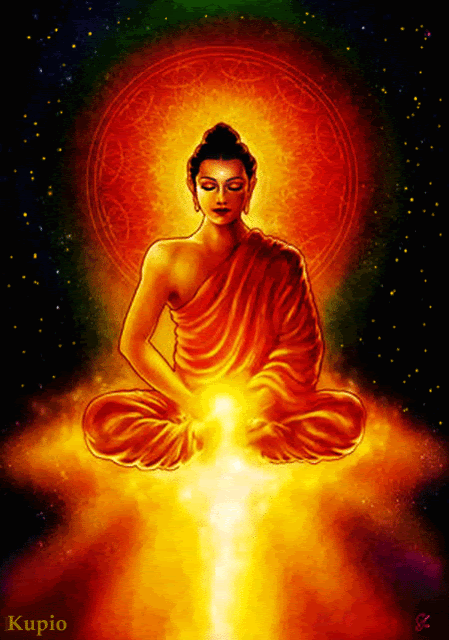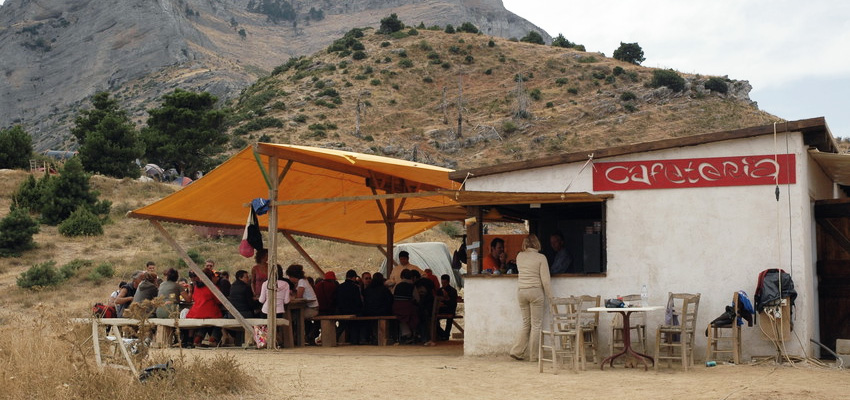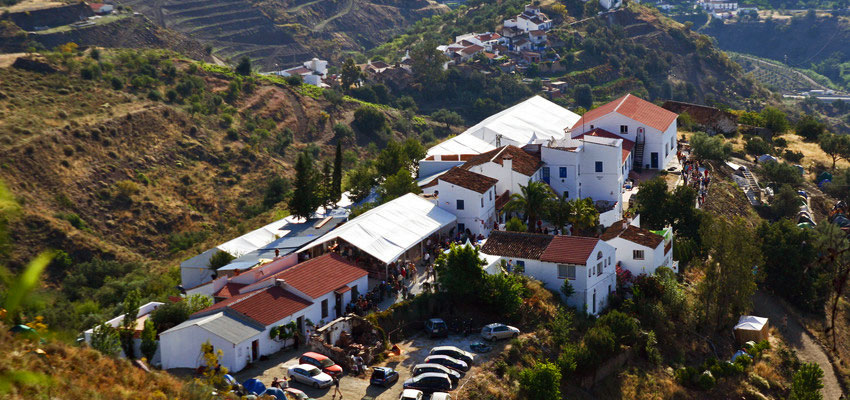Right Eating: What the Buddha Taught
Introduction
As
practitioners of the Buddhist dharma, we continually strive to act in
ways that reduce the amount of suffering in the world, both for
ourselves and for others. When it comes to animals, the single greatest
impact we have on their suffering is the decision to eat – or not to eat
– them.
In considering
a diet that is consistent with the dharma, the scriptures offer a
variety of teachings that can help us determine what constitutes Right
Eating. For those who aim to live in accordance with the dharma in all
aspects of their lives, it is an inquiry that must be made. Only after a
thorough and honest investigation can we determine what constitutes
Right Action in this area.
History of the Scriptures
Any
inquiry begins with threshold question of the authenticity of the
scriptures and specific teachings within them, and this is the subject
of significant and unresolved debate. There is universal agreement that
following the Buddha’s final passing the teachings were handed down
orally for several hundred years. During that time, Buddhism split into
numerous sects, at one point totaling as many as 18, each with their own
scriptures. When the scriptures were finally preserved in writing, the
written versions differed significantly, reflecting the lack of
agreement over what constituted the original teachings.
The
two largest branches of modern Buddhism are Mahayana and Theravada, and
while they have differences, there is also agreement on many, if not
most, of the fundamental teachings. Rather than take a position on
scriptural authenticity, our discussion will combine both lineages,
except for the section on Right Eating. (When citations are from sutras
they are Mahayana, and when they are from suttas and Nikayas they are
Theravadin.) In both traditions, however, the teachings lead invariably
to the conclusion that Right Eating does not include eating animals.
Morality
Importance
Morality
plays a central role in both Mahayana and Theravada Buddhism. In the
oft-quoted Kalama Sutra, Buddha Shakyamuni asserts unequivocally that,
regardless of our views on karma and rebirth, there are moral
imperatives about which we can be certain – we must abandon hate,
malice, and defilement, and cultivate purity of mind. Whatever our
opinions may be on other matters, however essential, morality is
indispensable:
The disciple of the Noble Ones, Kalamas, who has such a hate-free
mind, such a malice-free mind, such an undefiled mind, and such a
purified mind, is one by whom, here and now, these four assurances are
found.
Morality
is also the foundation of the threefold division of morality (sila),
concentration (samadhi) and wisdom (panna) found in the Eightfold Noble
Path, and without its development concentration and wisdom cannot be
adequately cultivated (sila, samadhi, panna, and tikotiparisuddha
(below) are Pali terms):
[T]he Noble Eightfold Path is included by the three aggregates.
Right speech, right action and right livelihood – these states are
included in the aggregate of virtue. (Culavedalla Sutta, Majjhima Nikaya
44:11)
Come, bhikkhu, be virtuous, restrained with the restraint of the
Patimokkha, be perfect in conduct and resort, and seeing fear in the
slightest fault, train by undertaking the training precepts. (Dantabhumi
Sutta, Majjhima Nikaya 125:15)
This
is such an essential point that it is made in the very first line of
the Vissudhimagga, written by Buddhaghosa and considered the classic
treatise on Theravadin meditation. “When a wise man, established well in
virtue, Develops consciousness and understanding, Then as a bhikkhu,
ardent and sagacious He succeeds in disentangling this tangle.” (citing
Samyutta Nikaya i. 13)
Non-Killing
First
among the moral injunctions, and one that also is accepted and shared
by all schools and lineages of Buddhism, is the First Precept – Do Not
Kill: I undertake the precept to refrain from destroying living
creatures.
This
practice of not killing, or not causing harm, stems from the same
quality that led the Buddha to end his solitude following his awakening
and go into the world to teach – compassion. Just as his purpose in
enunciating the Four Noble Truths was to provide a guide to the end of
suffering, so too the First Precept, by recognizing that all beings want
to live and want to be free of suffering, stems from this very same
compassion. The act of killing and the taking of life is anathema to
this guiding principle. It is a manifestation of the unwholesome root
dosa, or ill will, and it is a cause of suffering for both yourself and
others:
Abandoning the taking of life, the ascetic Gautama dwells refraining
from taking life, without stick or sword, scrupulous, compassionate,
trembling for the welfare of all living beings. (Brahmajala Sutra)
Here, a noble disciple, having abandoned the destruction of life,
abstains from the destruction of life. (Streams, Anguttara Nikaya
8:39(4))
I am one who wishes to live, one who does not wish to die; I desire
happiness and am averse to suffering. Since I am one who wishes to
live…and am averse to suffering, if someone were to take my life, that
would not be pleasing and agreeable to me. Now if I were to take the
life of another – of one who wishes to live, who does not wish to die,
who desires happiness and is averse to suffering – that would not be
pleasing and agreeable to the other either. What is dis- pleasing and
disagreeable to me is displeasing and disagreeable to the other too. How
can I inflict upon another what is displeasing and disagreeable to me?
Having reflected thus, he himself abstains from the destruction of life,
exhorts others to abstain from the destruction of life, and speaks in
praise of abstinence from the destruction of life. (Sotapattisamyutta,
The People of Bamboo Gate, Samyutta Nikāya 55:7)
Importantly,
the prohibition on killing does not apply only to someone personally
killing an animal. It also applies to someone who causes another to
kill. This recognizes the notion that you are not absolved from
responsibility by simply asking another to do an act that you choose not
to do yourself. Whether you solicit someone to kill on your behalf or
conspire with another to kill, you are as morally liable as if you did
the killing yourself:
All beings fear danger, life is dear to all. When a person considers
this, he does not kill or cause to kill. (Dhammapada, 129)
One should not kill any living being, nor cause it to be killed, nor
should one incite any other to kill. (Nalaka Sutta, Sutta Nipata
III:11(26-27))
These sentiments about compassion and lovingkindness towards all beings are also reflected in the familiar phrases:
May all beings be healthy. May all beings be peaceful and at ease.
May all beings be safe. May all beings be happy. May all beings be free
from suffering.
These are not idle words or ideas to be taken lightly. They are meant to be lived every moment.
Animals
While
on its face this moral precept appears similar to the Judeo-Christian
admonition ‘Thou Shalt Not Kill’ found in the Ten Commandments, there is
a profound difference. While the Commandment applies only to humans, it
is universally understood and recognized that the Buddhist precept
applies to the entirety of sentient beings – living beings that feel
pain – including animals. The point is made often:
Let him not destroy, or cause to be destroyed, any life at all, or
sanction the acts of those who do so. Let him refrain even from hurting
any creature, both those that are strong and those that tremble in the
world. (Dhammika Sutta, Sutta Nipata II:14(19))
Whether they be creatures of the land or air, whoever harms here any
living being, who has no compassion for all that live, let such a one
be known as depraved. (Sutta Nipata)
I have loving-kindness for footless creatures; for those with two
feet I have loving-kindness. I have loving-kindness for those with four
feet; for those with many feet I have loving-kindness. May all beings,
all living beings, all creatures, every one, meet with good fortune; may
nothing bad come to anyone. (Snakes, Anguttara Nikaya 4:67)
Buddhaghosa
also made the point, defining Virtue as “the states beginning with
volition present in one who abstains from killing living things…” (I 17)
In both the Theravada and Mahayana scriptures, in order to abide in the
dharma, one must refrain from killing animals.
While
the above is reason enough not to kill animals, there is another
rationale for the practice of non-harm towards all sentient beings.
According to the teachings, at some point you have been related to
virtually every single being in existence:
All male beings have been my father and all females have been my
mother. There is not a single being who has not given birth to me during
my previous lives, hence all beings of the Six Realms are my parents.
Therefore, when a person kills and eats any of these beings, he thereby
slaughters my parents. Furthermore, he kills a body that was once my
own, for all elemental earth and water previously served as part of my
body and all elemental fire and wind have served as my basic substance.
(Brahmajala Sutra)
It is not easy, bhikkhus, to find a being who in this long course
has not previously been your mother…your father…your brother…your
sister…your son…your daughter. (Anamataggasamyutta, Mother, Etc.,
Samyutta Nikaya 15:14-19)
When you kill a cow or a chicken, you are likely killing a creature that was once a close relative.
The
unwholesome nature of killing animals is also seen throughout the Pali
canon in its strong and repeated condemnations of trades involving the
slaughter of animals. It’s such an ignoble line of work that it is
specifically proscribed in the Eightfold Noble Path’s factor of Right
Livelihood, and as someone who destroys life a slaughterer is destined
for an unfortunate rebirth, either in one of the painful hells or as a
species of creeping animal:
Bhikkhus, a lay follower should not engage in these five trades.
What five? Trading in weapons, trading in living beings, trading in
meat, trading in intoxicants, and trading in poisons. (Vanijja Sutta,
Anguttara Nikaya 5:177)
What kind of person, monks, torments himself and pursues the
practice of torturing others? Here some person is a butcher of sheep, a
butcher of pigs, a fowler, a trapper of wild beasts, a hunter, a
fisherman, a thief, an executioner, a prison warden, or one who follows
any other such bloody occupation. This is called the kind of person who
torments others and pursues the practice of torturing others. (Kandaraka
Sutta, Majjhima Nikaya 51:9)
Here, someone destroys life; he is murderous, bloody-handed, given
to blows and violence, merciless to living beings…His destination is
crooked; his rebirth is crooked; But for one with a crooked destination
and rebirth, I say, there is one of two destinations; either the
exclusively painful hells or a species of creeping animal. (Creeping,
Angutarra Nikaya 10:216)
In
short, the proscription against killing or causing another to kill an
animal is undisputed in the Buddhist teachings. It is the foundation of
morality, which is the cornerstone of the development of concentration
and wisdom. The killing of animals has no place in the dharma.
Right Eating
While
the basis for vegetarianism, even veganism, is found in both the
Mahayana and Theravada lineages, it’s presentation is markedly
different. Accordingly, the specific teachings of the respective
traditions will be discussed separately.
Mahayana
The
question of eating animals is addressed at length in several Mahayana
sutras, and the prohibition is clear and unequivocal. In the Lankavatara
Sutra the Buddha offers numerous reasons to abstain from eating animals
and continually reaches the same conclusion:
For innumerable reasons, Mahamati, the Bodhisattva, whose nature is compassion, is not to eat any animal flesh.
Thus, Mahamati, whenever and wherever there is evolution among
sentient beings, let people cherish the thought of kinship with them,
and holding the thought intention of treating them as if they were our
only child, and therefore refrain from eating their flesh. So much for
more should Bodhisattvas, who are committed to being compassionate
towards all sentient beings, and whose inner nature is compassion
itself, choose to refrain from eating animal flesh. For a Bodhisattva to
keep good integrity with the Dharma, he or she should not make any
exceptions to the eating of animal flesh.
Nor should a Bodhisattva eat flesh sold by others for monetary
profit…let the Bodhisattva discipline himself or herself to attain
compassion and refrain from eating animal flesh.
The food of the wise, which is eaten by Sages, does not consist of
animal flesh or blood. Therefore let the Bodhisattva refrain from eating
animal flesh. In order to guard the minds of all people, Mahamati, let
the Bodhisattva whose nature is holy and who wishes to avoid unnecessary
criticism of the Buddha Dharma, refrain from eating animal flesh.
The subject is also addressed in the Mahaparinirvana Sutra:
There is no animal flesh to be regarded as pure by any exception. It
does not matter if the giving of animal flesh for us to eat is
premeditated or not, asked for or not, or whether extreme hunger is
present or not. Therefore it is wise to not eat animal flesh in any
circumstance which naturally arises within our life. Let yogis not eat
any animal flesh. All Buddhas teach all people to not eat animal flesh,
and especially wish those under their guidance to not eat animal flesh.
Sentient beings who feed on each other will be reborn as carnivores in
the animal realm.
Animal flesh eating is rejected by Buddhas, Bodhisattvas, and
Disciples. If a person eats animal flesh out of shamelessness, he or she
will not be able to cultivate a wholesome sense of what is appropriate.
Animal flesh eating is forbidden by Me everywhere and for all time for those who abide in compassion.
And in the Surangama Sutra, the Buddha instructs:
How can a bhikkshu, who hopes to become a deliverer of others,
himself be living on the flesh of other sentient beings? Pure and
earnest bhikkshus, if they are earnest and sincere, will never wear
clothing made of silk, nor wear boots made of leather, because it
involves the taking of life.
Not
only are the Mahayana sutras clear on the question of eating animals,
but the Buddha also recognized and anticipated that people would be
resistant to the practice of not eating meat. He discussed this in the
Mahaparinirvana Sutra:
Let a person not give power to the many rationalizations given to
justify animal flesh eating. What logicians say under the influence of
their addictive craving for animal flesh is sophistic, delusional, and
argumentative. What they imagine that they witnessed, heard, or
suspected that the Blessed One has said, or another Buddha said or did,
is grossly distorted.
As greed is a hindrance to liberation, so are the objects of greed a
hindrance to liberation. Objects of greed like animal flesh eating and
consuming alcohol are hindrances to liberation.
A time may come when deluded people may say, “Animal flesh is
appropriate food to eat, has no karmic consequences, and is permitted by
the Buddha”.
Some will even say that eating animal flesh can be medicinal. It is
more like eating the flesh of your only child. Let a yogi be attuned to
what is balanced and nourishing to eat, be adverse to consuming animal
flesh and alcohol, and with this clarity go about peacefully begging for
food, trusting that what is wanted and needed to sustain a healthy life
will be supplied.
In short, in the Mahayana scriptures the proscription against eating animals is explicit and conclusive.
Theravada
Unlike
the Mahayana scriptures, in which eating animals under all
circumstances is repeatedly and explicitly condemned, the Pali canon
provides much less direct guidance in this area. While one passage,
discussed in the next section, suggests a narrow exception to the
general principle of not eating animals, the totality of the teachings
nevertheless leads to an undeniable conclusion – eating animals is
inconsistent with the Theravada scriptures.
Just
as the First Precept’s admonition to not kill is a manifestation of
compassion, so too is the decision to stop eating animals. In order for
you to eat a steak or a chicken, at some point in the process the animal
has to be killed. That’s inescapable. And with today’s mass production
of meat, the sheer number of animals killed is staggering – estimated at
50 to 70 billion a year worldwide – as is the amount of suffering
inflicted on those animals, most of whom are raised on commercial animal
farms.
While
the slaughter may be hidden from sight and done by others, when we
purchase meat we are soliciting that killing act. We are asking those
who work within the meat and dairy industry to do the killing for us so
that we can eat that hamburger or chicken. We are complicit, and the
teachings are very clear on this point. Whether you kill the animal
yourself or pay someone else to do it, you cannot escape moral
responsibility.
By
participating in the system, we contribute to both the suffering of the
animal and the act of taking its life. Given the numbers we may be only
a tiny fraction of the overall consumption, but however marginal, we
cannot distance ourselves from the culpability. Looked at another way,
if no one ate meat no animals would be killed. Animals are killed only
because there is a demand for meat. Animals are killed only because
there is a demand for meat. When we buy meat at a store or restaurant,
another animal will be killed to replace it. By abstaining from eating
animals, we reduce the demand and thus the killing. By eating animals,
we increase the killing.
The
principle of not taking part in any aspect of the meat industry,
whether you kill the animal yourself or not, is also implicit in the
Noble Eightfold Path factor of Right Livelihood, which lists five trades
or businesses that cause harm to others and should thus be avoided.
(See Vanijja Sutta, supra.) One of the businesses – trading in meat –
prohibits selling meat, and trading in living beings includes raising
animals for slaughter. The fact that raising animals and selling meat,
in addition to the actual slaughtering, is proscribed by this path
factor, makes it clear that it is not simply the person killing the
animal who is doing harm. If raising the animal is Wrong Livelihood and
selling meat is Wrong Livelihood, how can purchasing and consuming the
meat be Right Eating? Anyone who participates in the process in any
capacity is causing harm, and this includes those who eat the final
product.
The
decision to stop eating meat is an act of compassion consistent with
the First Precept. To continue to eat meat is a violation of this
paramount Buddhist quality and is inconsistent with the practice of
nonharm in all aspects of one’s life.
The Three Purities
While
the totality of the teachings dictate a vegetarian diet, many dedicated
practitioners continue to eat animals, and the most common
justification relies on a notion found in the Theravada scriptures
called the three purities (tikotiparisuddha). The formulation is found
in several places, including the Jivaka Sutta, where the Buddha responds
to the accusation that he eats animals killed for him. He replies:
Jivaka, I say that there are three instances in which meat should
not be eaten: when it is seen, heard, or suspected [*see below]. I say
that meat should not be eaten in these three instances. I say that there
are three instances in which meat may be eaten: when it is not seen,
not heard, and not suspected [*see below]. I say that meat may be eaten
in these three instances.” (Majjhima Nikaya 55; see also Suttavibhanga I
298 and Mahavagga VI 324 (Horner translations) and Siha Sutta,
Anguttara Nikaya 8:12)
*In
the original Pali text, the sentences end after the word ‘suspected.’
In his translation Ven. Ñāṇamoli inserted a bracketed section – [that
the living being has been slaughtered for the bhikkhu] – an insertion
retained by Ven. Bodhi in his editing.
For
those who rely on the three purities to justify meat-eating, the logic
goes as follows. According to the three purities, if an animal is not
killed for you, then it’s okay to eat it. When you eat meat purchased at
a market, butcher shop or restaurant, the animal is not killed for you.
Therefore, it’s okay to eat meat under these circumstances.
The
crux of the matter is the question of whether meat bought at a market
or restaurant is from an animal that was killed for you, and this
question has already been answered. Whether it’s a big and complex
corporation or the small butcher shop in your supermarket, the meat
industry kills animals so that buyers in the marketplace can buy them.
When you buy meat from them, you are the person for whom the animal was
killed. If not for you and others like you, the animal would not have
been killed.
The
only way to get around this is to take an extremely literal and narrow
interpretation of the three purities which would require that the
specific animal be killed specifically for you, not for the consumer in
general. It’s certainly the case that when the butcher was killing the
animal he didn’t do it with you personally in mind. But is this in
accord with the intent of the doctrine, or is it going out of your way
to justify an action that is inconsistent with the spirit of the
teachings?
Inquiry
For
many people, the notion of not eating animals is contrary to the belief
system they were raised with. It’s difficult to discard such ingrained
and conditioned habits and values, but this is exactly what the Buddha
urged us to do. Whether it’s tradition, cherished writings, the words of
an esteemed teacher or even the teachings of the Buddha himself, we are
exhorted to question them and figure things out for ourselves:
Come, Kalamas, do not go by oral tradition, by lineage of teaching,
by hearsay, by a collection of scriptures, by logical reasoning, by
inferential reasoning, by reasoned cogitation, by the acceptance of a
view after pondering it, by the seeming competence [of a speaker], or
because you think: ‘The ascetic is our guru.’ But when, Kalamas, you
know for yourselves: ‘These things are unwholesome; these things are
blameworthy; these things are censured by the wise; these things, if
accepted and undertaken, lead to harm and suffering,’ then you should
abandon them. (Kesaputtiya, Angutarra Nikaya, 3:65(1))
Do not go upon what has been acquired by repeated hearing, nor upon
tradition, nor upon rumor, nor upon what is written in scripture, nor
upon surmise, nor upon an axiom, nor upon specious reasoning, nor upon a
bias towards a notion that has been pondered over, nor upon another’s
seeming ability, nor upon the consideration, “This monk is our teacher.”
Kalamas, when you yourselves know: “These things are good; these things
are not blamable; these things are praised by the wise; undertaken and
observed, these things lead to benefit and happiness, enter on and abide
in them.” (Kalama Sutra)
For
many, the practice of eating animals is difficult to abandon. But the
question of eating them is central to the dharma, and like all others,
it requires us to take a hard and critical look at our own practices.
Even if the outcome makes us uncomfortable or leads to an unwanted
change in our eating habits, it is change we must embrace if we are to
progress along the path.
Quotes
The
lineage of vegetarian and even vegan monks and teachers is long and
distinguished. Many of these noteworthy Buddhists have spoken eloquently
about the subject of eating animals.
Eating meat, at the cost of great suffering for animals, is
unacceptable. If, bereft of compassion and wisdom, you eat meat, you
have turned your back on liberation. The Buddha said, “The eating of
meat annihilates the seed of compassion. —Shabkar Tsodruk Rangdol
“Buddhists
are encouraged to love all living beings and not to restrict their love
only to human beings. They should practice loving kindness towards
every living being. The Buddha’s advice is that it is not right for us
to take away the life of any living being since every living being has a
right to exist. Animals also have fear and pain as do human beings. It
is wrong to take away their lives.” —Ven. K. Sri Dhammananda Maha Thera
“Buddhas
and Bodhisattvas have already expounded extensively on the faults of
eating meat in the Elephant Power Sutra, Mahamegha Sutra, Nirvana Sutra,
Angulimala Sutra, Lankavatara Sutra, Sutra Requested by Subahu, and
various Madhyamika treatises.” —Khenpo Sodargye Rinpoche
Some Buddhists maintain that the Buddha never said we should be
vegetarians, and that monks (who the bulk of the Buddhist rules apply
to), may eat whatever is offered to them, as long as they do not see,
hear, or suspect that the animals, fish or fowl were killed especially
for them; if they so see, hear or suspect, they are forbidden to eat the
flesh. But this standpoint is totally indefensible, as anyone who looks
at things a little objectively can see. And to say, as some people do,
that by eating meat, they are helping the animals with their spiritual
growth, is too ridiculous and transparent to be seriously considered for
a moment.
Firstly, the Buddha never called anyone to believe or follow Him;
instead, He urged people to see for themselves and find out what is
true. Even so, many Buddhists become prisoners of books, repeating
things like parrots or tape-recorders, without investigating, thereby
missing the great value of the Buddha’s Way, which is a Way of
self-reliance. — Ven. Abhinyana
“As
the noble Katyayana observed when on alms round, the meat we consume in
our life is the flesh of our mothers and fathers from previous lives.
If we are upright and have a conscience, how can we bear to eat the
flesh of our parents killed by a butcher? If we quiet the mind and
ponder this, we will definitely be filled with great compassion for
these pitiful beings that were our mothers.” —Jigme Lingpa
The beings with unfortunate karma that we are supposed to be
protecting are instead being killed without the slightest compassion,
and their boiled flesh and blood are being presented to us and we —their
protectors, the Bodhisattvas— then gobble it all up gleefully, smacking
our lips. What could be worse than that?
It is said that offering to the wisdom deities the flesh and blood
of a slaughtered animal is like offering to a mother her murdered child.
If you invite a mother for a meal and then set before her the flesh of
her own child, how would she feel? It is with the same love as a mother
for her only child that the Buddhas and Bodhisattvas look on all beings
of the three worlds. —Patrul Rinpoche
“Just
as no pleasures can bring delight to someone whose body is ablaze with
fire, the great compassionate ones cannot be pleased when harm is done
to sentient beings. Flesh free from the three objections, not prepared,
unasked, unsolicited, there is none. Therefore one should not eat
flesh.” —Arya Shantideva
Flesh-eating is wicked, for we should not kill, nor cause to kill.
To purchase flesh in the bazaar is to cause slaughter; for the supply is
proportional to the demand. […] “He who consents to the killing, he who
strikes, he who slaughters, he who buys, he who cooks, he who serves,
he who eats —they are all murderers.” These are the words of Manu, an
Indian philosopher. So everyone is an accomplice in the murderous game;
beginning from the butcher and ending with the one who eats.
There is a common belief in Buddhist countries that any one may eat
flesh provided he does not kill the animal with his own hands; but it is
not so, because eating is the cause of slaughter. If we become
vegetarians, all the butchers will have to close their shops and turn to
a better profession. By eating flesh we keep a class of people in a
miserable profession. It is not fair that we should force the butchers
to go to hell for our sake. If we become vegetarians, then the whole
world would be at peace.
There are people who sacrifice to the gods, and there are people who
sacrifice to their stomachs — I think that their stomach is their god.
Let us practice infinite loving-kindness. It is impossible to say: “Let
all beings be happy.” Because, if a flesh-eater says: “May all beings be
happy”, while he is crushing flesh between his teeth, it will be sheer
hypocrisy. Therefore if a flesh-eater wants to be logical, he should
say, while eating flesh food: “May all creatures be happy, except those
creatures which I am chewing between my teeth.” For I am sure that the
creatures which are being masticated, cannot be happy, or could not have
been happy when they were killed for the sake of the flesh-eater.
Therefore he cannot practice all embracing love when he is eating flesh,
because by eating flesh, he automatically demands a certain proportion
of the creatures in the world to die for his sake. It is the doctrine of
selfishness that one should live on the flesh of another.—Ven. U
Lokanatha
“The
reason for being a vegetarian is not so that we can live a long time,
but because of the mind of compassion and equality. First, sentient
beings are future Buddhas and Bodhisattvas; therefore, we should not eat
their flesh. Second, everyone has Buddha nature. Besides protecting our
own life, we also must respect the lives of all sentient beings. Third,
vegetarianism is based on the principle of causality that spans the
past, present, and future. Therefore, we clearly understand the reason
for vegetarianism is the Bodhisattva cause, the right cause.” —Grand
Master Wei Chueh
“Mahayanists
observe the Bodhisattva precepts, one of which is the prohibition
against partaking of the flesh of an animal. This prohibition is called
tapasa shila-vrata, and is a practical rule for eradicating the evil of
wrath. This Bodhisattva precept was observed by Lord Buddha when he was
called Shakya Bodhisattva, before he attained Enlightenment. ” —Ven.
Thich Huyen-Vi
Eating meat is the direct cause of an immense quantity of suffering
for sentient beings. Many people, myself included, struggle with the
notion that a religion as categorically opposed to violence as Buddhism
can so blithely wave away the suffering inherent in eating meat. When we
recite the first precept, we say, ‘I undertake the training to refrain
from killing living beings.’ This is a challenge, and in itself is a
powerful ethics. Yet it is merely a short summary of a principle. It was
never meant to fully describe the virtue of harmlessness. When the
Buddha spoke of this precept in more detail, this is what he had to say:
“Having abandoned the taking of life, refraining from the taking of
life, one dwells without violence, with the knife laid down, scrupulous,
full of mercy, trembling with compassion for all sentient beings.”
This is not just an ethic of allowability. It doesn’t merely set a
minimum standard. It calls us out, asking us to aspire to a higher sense
of compassion, an ethic that deeply feels for the welfare of all
beings. More than just asking, ‘Does this act come from an intention to
harm,’ we ask ourselves, ‘Is this act the best I can possibly do to
promote the welfare of all?’ Rather than simply escaping bad kamma, we
create good kamma. —Ajahn Sujato
“The
salvation of birds and beasts, onese lf included: this is the object of
Shakyamuni’s religious austerities.” —Zen Master Ikkyu
“We
should not restrict our Bodhichitta to a limited number of beings.
Wherever there is a space, beings exist, and all of them live in
suffering. Why make distinctions between them, welcoming some as loving
friends and excluding others as hostile enemies?” —Kyabje Dilgo Khyentse
Rinpoche
Aware of the suffering caused by the destruction of life, I
undertake to cultivate compassion and learn ways to protect the lives of
people, animals, plants, and minerals. I am determined not to kill, not
to let others kill, and not to condone any act of killing in the world,
in my thinking, and in my way of life. —Thich Nhat Hanh
“It’s
best to avoid eating meat out of compassion. Before eating the meat,
think of where it came from, through cutting an animal’s neck, against
its will, and how much suffering the animal experienced. After thinking
about that, you can’t eat the meat!” —Lama Thubten Yeshe
“Life
is more precious than anything else in the world. Even insects want to
live. Whenever we break any of the Five Precepts of Buddhism , we have
violated some other sentient being. Whenever we kill anyone, we violate
that being at the deepest level possible. Meat eating should be
avoided…” —Ven. Master Hsing Yun
As the Buddha taught over two and a half thousand years ago, there
are many benefits to following a vegetarian lifestyle —both for us and
for other beings as well. Today, so many centuries later, the Buddha’s
words are as powerful as ever. —Geshe Thupten Phelgye (Dharma Voices for
Animals Contributor)
“The
best way to protect and liberate lives is to adopt a vegetarian diet
because sentient being will be slaughtered as long as there are people
who eat meat. Hence, in present situation, be it life protection or life
liberation, I think that the best way will be to adopt a vegetarian
diet.” — Ogyen Trinley Dorje, the XVII Gyalwang Karmapa
“Anyone
familiar with the numerous accounts of the Buddha’s extraordinary
compassion and reverence for living beings —for example his insistence
that his monks strain the water they drink lest they inadvertently cause
the death of any micro-organisms— could never believe that he would be
indifferent to the sufferings of domestic animals caused by their
slaughter for food.” —Roshi Philip Kapleau
Vegetarianism cultivates patience, compassion, and wisdom. —Dharma Master Cheng Yen
“If
one has strong determination, one will avoid doing evil deeds at all
costs and under any circumstances. We certainly face difficulties in
becoming full vegetarians. However, when such obstacles arise, we should
remember how every sentient being had at one point or another been our
parents.” —Drubwang Rinpoche
“Knowing
all the faults of meat and alcohol, I have made a commitment to give up
meat and alcohol. I have also declared this moral to all my
monasteries. Therefore, anyone who listens to me is requested not to
break this Dharmic moral.” —Chatral Rinpoche (Dharma Voices for Animals
Contributor)
There is just no reason why animals should be slaughtered to serve
as human diet when there are so many substitutes. Man can live without
meat. People think of animals as if they were vegetables, and that is
not right. We have to change the way people think about animals. I
encourage the Tibetan people and all people to move toward a vegetarian
diet that doesn’t cause suffering. —HH Tenzin Gyatso, the XIV Dalai Lama













